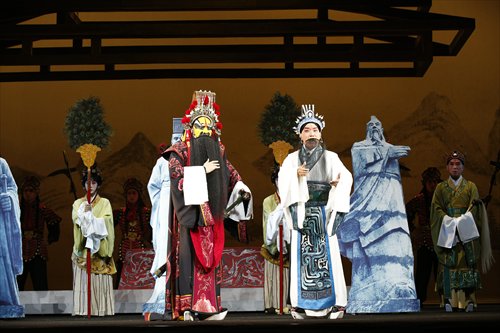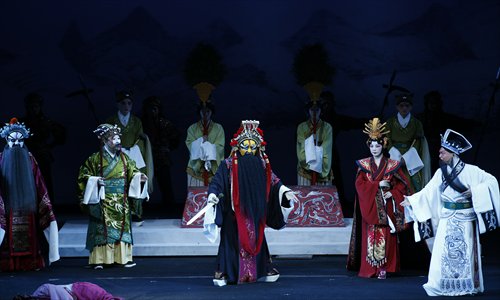HOME >> BUSINESS, METRO BEIJING
Qu Yuan
By Zhang Xinyuan Source:Global Times Published: 2014-9-8 19:23:01

The Chang'an Grand Theater will put on stage Shi Yukun's Peking Opera work Qu Yuan this month for the first time in Beijing. Photo: Courtesy of Jingju (Beijing Opera)Theater Company of Beijing

The Chang'an Grand Theater will put on stage Shi Yukun's Peking Opera work Qu Yuan this month for the first time in Beijing. Photo: Courtesy of Jingju (Beijing Opera)Theater Company of Beijing
"The capital Ying has fallen, Chu State (1042BC-223BC) has been lost and my beloved country is gone," cried Qu Yuan dramatically during the final scene of the Peking Opera Qu Yuan. Based on the life of Qu Yuan ((340BC-278BC), a key historical Chinese figure, it portrays all the eloquence and drama that Peking Opera performances are renowned for throughout the world.
The opera will make its debut at Chang'an Grand Theater in Dongcheng district this month, and will be performed for two days on September 24 and 25. Directed by Shi Yukun, a famous Peking Opera director whose works include Liu Luoguo, this performance involves young actors such as Zhang Jianfeng and Yang Shaopeng to give the opera a new lease of life.
It tells the real-life story of Qu Yuan, a patriotic poet and politician in the Chu State during the Warring States period (475BC-221BC). Qu repeatedly advised the emperor Chu to reform against political corruption, but in the end he was framed and wrongly exiled for his efforts. In 278BC, Chu State was conquered by the Qin State, and Qu took his own life by jumping into Miluo River.
There are several other forms of art works based on Qu Yuan's life, such as poetry and modern dramas which commemorate this great figure. However, this opera, with its traditional stage and production settings that resemble the Warring States period, is considered as the greatest portrayal of the man.
"The stage settings use authentic Chinese art, with the actors dressing in traditional costumes, all of which help to depict Qu Yuan from the ancient times," said Zhang Jianfeng, one of the leading actors in the play.
The stage is decorated in the style of Chinese ink wash painting. "The story not only tells the story of Qu Yuan's fate, it also shows the fate of the Chu State and how it prospered and declined. The stage changes throughout the story," said Liu Xinglin, the stage designer.
The play was initially written by Lü Yuzhong, the deputy head of the art department at the Ministry of Culture. Not satisfied with following his predecessors, Lü decided to take a new approach in presenting Qu's life.
"Unlike other artistic works based on Qu Yuan, which solely focus on his patriotism to the feudal Chu State and its emperor, Lü's script emphasizes more on the beauty of humanity in Qu Yuan," summarized director Shi.
"In the opera choreography, we specifically revealed human aspects of Qu Yuan's character several times to echo with the script's theme," added Shi.
The music in the opera is also specially designed to depict Qu Yuan's turbulent life, with the composer Zhu Shaoyu even adapting folk music elements from the Hubei Province where the Chu State was located.
The opera has a special arrangement, in that it uses two groups of actors, with each one taking to the stage on rotation.
The leading actors of these two groups, Zhang Jianfeng and Yang Shaopeng, belong to different Peking Opera factions, which are the Xi faction and Yang faction respectively.
"The singing style and stage demeanor of the two factions are very different. We have consciously made Xi faction's style more graceful and Yang faction's style more delicate," said Yang, the leading actor from the Yang faction.
"We hope more audiences, especially those younger audiences who are interested in Peking Opera and China's history, can come to this traditional play and enjoy the different styles of performances," added Yang.
Posted in: Press Release, Enterprise